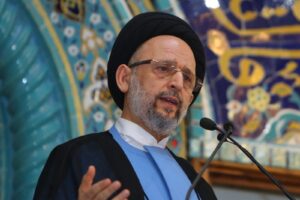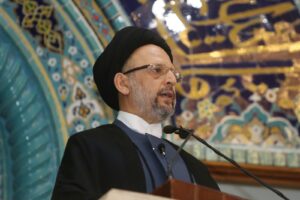A story happened with Prophet Dawood
His Eminence, Sayyed Ali Fadlallah, delivered the two Friday prayer sermons at the Imamain Al-Hassanain Mosque, Rabi Ath-Thani 26, 1442 H. /December 11, 2020. Several prominent religious scholars, dignitaries and believers attended the Jumu’a prayer. Following is the edited text of the sermons:
The first Sermon
Allah says in His Glorious Book: There was certainly in their stories a lesson for those of understanding. Never was the Qur’an a narration invented, but a confirmation of what was before it and a detailed explanation of all things and guidance and mercy for a people who believe. Allah, the Most Exalted speaks the truth.
One of these stories is the one Allah told in the SAD Surah. it is an incident that happened with Prophet Dawood whom Allah made a king, in addition to being a prophet, and said to him: O David! Lo! We have set you as a viceroy in the earth; therefor judge aright between mankind, and follow not desire that it beguile you from the way of Allah. This incident occurred when Dawood decided one day that he wanted to dedicate the whole day to worshipping and wished to see no one. He asked his guards not to let anybody in. But two men were able to fool the guards and enter to his room. Dawood thought they wanted to hurt him and he was afraid of them. But they immediately explained that they mean no harm and said: Be not afraid. We are just two litigants: one of us has committed excess against the other. So judge rightly between us, and be not unjust; and guide us to the Right Way. The first one said that his brother has 99 ewes while he has only one, and he insists that I should give him mine, and he got the better of me in argument and I came to you to support me. Dawood was provoked and got angry from this greedy brother who should have given his brother some of his ewes instead of taking his only one. He did not wait to hear what the other had to say and told him: He has certainly wronged you in seeking to add your ewe to his ewes. indeed, many who live together commit excesses, one to the other, except those that believe and act righteously; and they are but few. The wronging the brother did is not an exception . There are many brothers, friends and neighbors who wrong one another, not taking into account the need to be just, but only how to promote their own interests.
Thus, the two brothers left, having heard Dawood’s judgment who did not let the one whom he ruled decisively against defend himself. But Dawood thought about what had happened and discovered that he was hasty. He should have heard from the two parties, before ruling, even if he was sure that the first party was right. The proper procedure of trial requires hearing both the complainant and the defendant. He felt very remorseful and asked God to forgive him. Allah accepted his repent and pointed out to his high status: Thereupon We forgave him his shortcoming and indeed (an exalted position of) nearness awaits him, and an excellent resort.
Dear loved ones: Allah has recorded this story, so that we can learn some of its lessons:
The First Lesson: We should not be hasty in passing judgments whether against individuals or political, social and religious organizations. This is what Allah warned us from when He said: Humankind is made of haste. I will soon show you My signs, so do not ask Me to hasten them.
Allah has asserted that haste is a natural trait in man, but He asked him to resist it and count to ten, and even to hundred, before he passes a judgement The Messenger (p.) says: Deliberation is from Allah and hastiness is from the devil. Imam Ali (a.s.)says : ‘Mistakes happen frequently [when work is done] with haste. This is but natural, for thinking carefully and taking your time, allows one to study the issues thoroughly, so that the decisions would not be a product of tension or influenced by whims, but rather they would be sound and rational.
The second lesson: We ought not be satisfied when we pass any judgment by listening to one party, no matter how convincing his argument may be. We, should, for the sake of establishing justice, listen to the other party, especially if we are related to the first party. Islam has underscored this point and asked all judges to be fair in listening to both parties and even in looking at them. Imam Ali advises his judge to treat Muslims equally by way of your facial expression, speaking, and meeting so that those who are near you not to be tempted to do injustice and your enemy not to lose hope at your justice. We are in a dire need today
to adopt this methodology, not only in the judiciary but also in all the judgments we make so that they will not be influenced by our whims and interests.
Lastly the story of the two brothers highlights the disputes between brothers, relatives and neighbors, that would turn them to enemies, on matters that have to do mostly with inheritance, trade or family differences.
Dear loved ones: We have to hasten to end these disputes, before they aggravate and are bequeathed, either by reconciliation or by going to courts, including firstly the religious courts.
But what is more important is to prevent them from happening in the first place, by means of holding fast to piety and belief. Praise be to Allah, Lord of the worlds.
The second sermon
Worshippers of Allah, The Most Exalted, I advise you and myself with what Imam Ali(a.s.) said in his answer to a man who complained about his prayers not being answered. He said: Despite the fact that God has said “Call upon Me, I will answer you”, why is it that when we supplicate to Him, He does not answer our prayers?
The Imam (peace be upon him) replied: (Your hearts (and thoughts) have been unfaithful with respect to eight things (and this is the reason your prayers go unanswered))
1. You have acquired the cognizance of God but you do not fulfill what is due to Him; consequently, your cognizance of Him has not benefited your state!
2. You have brought faith upon His Messenger but (later) went on to oppose his
sunnah; where then is the yield of your faith?
3. You have read His book but have not acted upon it; you stated: “We have heard and we obey”, but then rose up in opposition to it!
4. You say: “We fear God’s punishment”, but perpetually perform acts that lead you closer to it.
5. You claim to be covetous of God’s reward however you continue to perform acts that lead you away from it.
6. You consume God’s bounties but do not extend thanksgivings to Him.
7. You have been ordered to be Shaitaan’s enemy (whereas you sketch plans to befriend him); you claim to be his enemy but, in practice, you do not oppose him.
8. You place into great scrutiny the faults of others but conveniently disregard your own; with such a state of affairs, how do you expect your prayers to be answered when you yourself have shut its doors? Be pious, rectify your deeds and enjoin the good and forbid the evil so that your prayers are answered. By this mutual relationship with God we would be
more capable of facing challenges.
We begin by Lebanon, which is moving quickly towards total collapse, after the Central Bank is about to spend from the required reserve… knowing that the government has not hastened to make all efforts to restore the plundered money and end all corruption, smuggling and waste, stimulate the economy and benefit from all its resources to face this deteriorating economic and financial reality.
The government has gone back to its habit of taking money from the citizens, despite the fact of being aware of their conditions. This time by talking about lifting its subsidizing of the basic consumer goods, although under the attractive pretense of rationalizing it. Nevertheless, it does not have a clear and practical plan of how to do that or how to ensure that the poor classes would be the ones that will benefit from it, although we tend to believe that most Lebanese have become poor. Even if this rationalizing was implemented in the proper way, it will only postpone the problem and not solve it. The real solution involves that those who hold power would devise the mechanisms that would get the country out of the dark tunnel, by forming a competent government that stays away from all partisan calculations and giving it all the jurisdiction it needs to deal with the intractable problems ….
But this does not seem probable, for most of the political class has not abandoned its narrow calculations and partisan interests.
Thus, we call on the Lebanese to shoulder their responsibility and tell the political responsibles that they should stop tampering with the country’s fate and the future of the Lebanese .
We say to this class that they should not bet that the people will remain silent for long, for the day the people will hold you accountable for what you are committing is surely coming.
As for the corruption files that are being published in the media and the press, we believe that it is very important that the Lebanese would become aware of what is going on in the administration, but we are afraid that it is being exploited in the struggle between the various political parties over their political shares and the pieces of Cake each one will get.
That is why, we renew our call to the judiciary to move to unveil the facts and establish justice and to prevent their use as a weapon in the political struggle, so that they emerge when there is an interest and then disappear when there is a different interest.
Lastly, we salute the stand of our people in the occupied Golan, in the face of the Zionist occupying army and their resistance of the enemy’s attempt to confiscate their lands.
This heroic stand expresses their true national spirit that clings to this Arabian lands that cannot be annexed or confiscated. It is an example of the free and conscious will that calls for Arab and Muslim solidarity. It is also a message that is immersed in blood for all those who normalized and those who intend to normalize.



